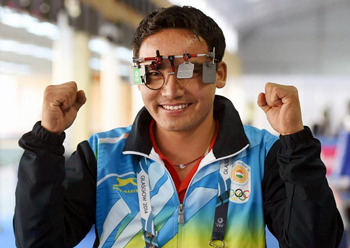Incheon, Sep 20: Shooters led India's medal hunt on the opening day of 2014 Asian Games at Incheon, where pistol-shooter Jitu Rai won India's first gold in the 50m event, shortly after Shweta Chaudhry opened India's account with a bronze in the 10m Women's Pistol event.
 Jitu held his nerves to clinch the yellow metal off his last short in the final, edging out silver medal-winner Chinese Wei Pang. Vietnam's Hoang Phuong Nguyen settled for the bronze.
Jitu held his nerves to clinch the yellow metal off his last short in the final, edging out silver medal-winner Chinese Wei Pang. Vietnam's Hoang Phuong Nguyen settled for the bronze.
Jitu has won six medals in last six competitions since June 2014.
Lucknow boy Jitu is also the first Indian shooter to qualify for the 2016 Rio Olympics after bagging a quota place with an impressive silver medal-finish at the 51st Shooting World Championships in August. Jitu also won a gold medal in the 50m pistol event in Commonwealth Games at Glasgow.
But he is not finished yet at Incheon, with his favourite 10m Pistol event, where he is ranked world No.1, scheduled for Sunday.
Earlier, Shooter Shweta Chaudhry gave India their first medal of the 17th Asian Games after the Faridabad girl clinched bronze in the Women's 10m Air Pistol final.
Shweta looked focused from the start as she sailed through even after her much fancied teammates Heena Sidhu and Malaika Goel failed to make the finals cut.
The World No.146 had a topsy-turvy ride in the finals as she led the standings after 3 shots but soon slipped to sixth and then improved to third.





Comments
Add new comment